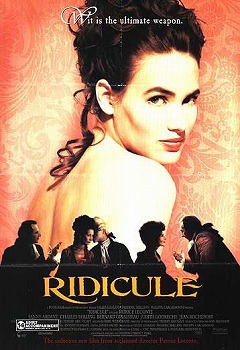
Ridicule is a 1996 French period drama film directed by Patrice Leconte and starring Charles Berling, Jean Rochefort, Fanny Ardant and Judith Godrèche. Set in the 18th century at the decadent court of Versailles, where social status can rise and fall based on one's ability to mete out witty insults and avoid ridicule oneself, the film's plot examines the social injustices of late 18th-century France, in showing the corruption and callousness of the aristocrats. Ridicule was selected as France's submission and was nominated for the Best Foreign Language Film at the 69th Academy Awards.
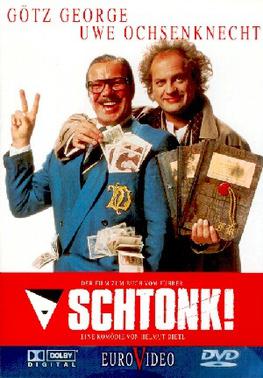
Schtonk! is a 1992 German satirical film which retells the story of the 1983 Hitler Diaries hoax. It was written and directed by Helmut Dietl.

Young Törless is a 1966 German drama film directed by Volker Schlöndorff, adapted from the 1906 novel The Confusions of Young Törless by Robert Musil. It deals with the violent and sadistic tendencies of a group of boys at an Austrian military academy at the beginning of the 20th century.

Armin Mueller-Stahl is a retired German film actor, painter and author, who also appeared in numerous English-language films since the 1980s. He was nominated for the Academy Award for Best Supporting Actor for his role in Shine. In 2011, he was awarded the Honorary Golden Bear.

Michael Haneke is an Austrian film director and screenwriter. His work often examines social issues and depicts the feelings of estrangement experienced by individuals in modern society. Haneke has made films in French, German, and English and has worked in television and theatre, as well as cinema. He also teaches film direction at the Film Academy Vienna.

Hanussen is a 1988 Hungarian film directed by István Szabó, centered around the life of Erik Jan Hanussen. Starring Klaus Maria Brandauer, the German-language film received an Academy Award nomination for Best Foreign Language Film. It was also featured at the 1988 Cannes Film Festival.
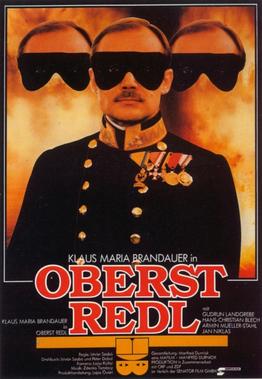
Colonel Redl is a 1985 biographical drama film by Hungarian director István Szabó. The plot, set in the period before World War I, follows the rise of Alfred Redl, an officer in the Austro-Hungarian Empire. Redl, who comes from a humble background, enters military school as a boy and an illustrious military career comes his way by virtue of his loyalty to the crown. He is appointed the head of an intelligence-gathering unit, but his attraction to men eventually causes his downfall.

Time of the Gypsies is a 1988 Yugoslav coming-of-age fantasy crime drama directed by Emir Kusturica. Filmed in Romani and Serbo-Croatian, Time of the Gypsies tells the story of a young Romani man with magical powers who is tricked into engaging in petty crime. It is widely considered to be one of Kusturica's best films. The film's shooting took place in Sarajevo, Skopje and Milan. It was selected as the Yugoslav entry for the Best Foreign Language Film at the 62nd Academy Awards, but was not accepted as a nominee.
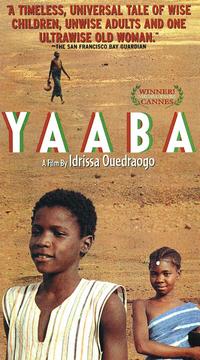
Yaaba is a 1989 Burkinabé drama film written, produced, and directed by Idrissa Ouedraogo, "one of the best known films from francophone sub-Saharan Africa". It won the Sakura Gold prize at the 1989 Tokyo Film Festival. The film was selected as the Burkinabé entry for the Best Foreign Language Film at the 62nd Academy Awards, but was not accepted as a nominee.

Friedrich Hans Ulrich Mühe was a German film, television and theatre actor. He played the role of Hauptmann (Captain) Gerd Wiesler in the Oscar-winning film Das Leben der Anderen, for which he received the gold award for Best Performance by an Actor in a Leading Role, at the Deutscher Filmpreis ; and the Best Actor Award at the 2006 European Film Awards.

Mephisto is a 1981 German political drama film co-written and directed by István Szabó, and based on the novel of the same title by Klaus Mann. It stars Klaus Maria Brandauer as a German stage actor who finds unexpected success and mixed blessings in the popularity of his performance in a Faustian play as the Nazis take power in pre-WWII Germany. As his associates and friends flee or are forced underground by the Nazi regime, the popularity of his character ends up superseding his own existence, until he finds that his best performance is keeping up appearances for his Nazi patrons.

Sebastian Koch is a German television and film actor. He is known for roles in the 2007 Academy Award-winning film The Lives of Others, in Steven Spielberg's Bridge of Spies, and as Otto Düring in the fifth season of the Showtime series Homeland.
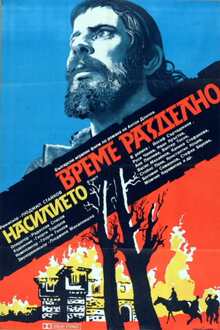
Time of Violence is a 1988 Bulgarian film based on the novel Time of Parting by Anton Donchev. It consists of two episodes with a combined length of 288 minutes. It premiered at the 1988 Cannes Film Festival where it was screened in the Un Certain Regard section. The film was selected as the Bulgarian entry for the Best Foreign Language Film at the 62nd Academy Awards.
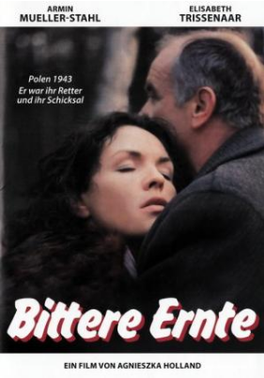
Angry Harvest is a 1985 West German film directed by Agnieszka Holland, based on a novel written by Hermann Field and Stanislaw Mierzenski while they were imprisoned by the Polish government in the early 1950s. The circumstances surrounding the novel's creation are detailed in Field's autobiographical account, Trapped in the Cold War: The Ordeal of an American Family.
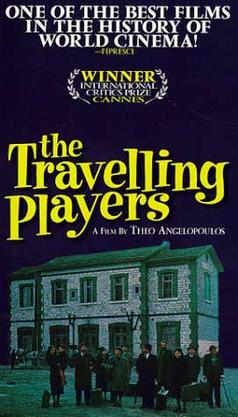
The Travelling Players is a 1975 Greek historical drama film written and directed by Theodoros Angelopoulos that traces the history of mid-20th-century Greece from 1939 to 1952.

Her Third is a 1972 East German film directed by Egon Günther and starring Jutta Hoffmann, Barbara Dittus, Rolf Ludwig and Armin Mueller-Stahl. The film is based on the short story Unter den Bäumen regnet es zweimal by Eberhard Panitz and tells the story of the single mother Margit looking for a new partner. The film was produced in 1971 by the DEFA film studio and premiered on 16 March, 1972 in East Berlin.
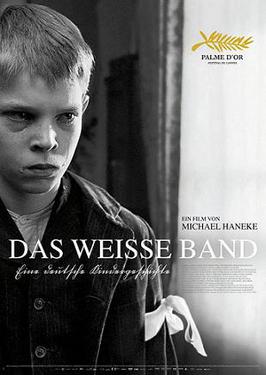
The White Ribbon is a 2009 German-language mystery drama film, written and directed by Michael Haneke. Released in black-and-white, the film offers a dark depiction of society and family in a northern German village just before World War I. According to Haneke, The White Ribbon "is about the roots of evil. Whether it's religious or political terrorism, it's the same thing."

The Cannibals is a 1988 Portuguese drama film directed by Manoel de Oliveira. It was entered into the 1988 Cannes Film Festival. The film was selected as the Portuguese entry for the Best Foreign Language Film at the 62nd Academy Awards, but was not accepted as a nominee.
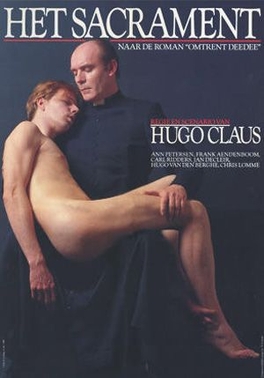
The Sacrament is a 1989 Belgian comedy film directed by Belgian author Hugo Claus. It was screened in the Un Certain Regard section at the 1990 Cannes Film Festival. The film is based on Claus' own novel Omtrent Deedee and his play Interieur. The film was selected as the Belgian entry for the Best Foreign Language Film at the 62nd Academy Awards, but was not accepted as a nominee.
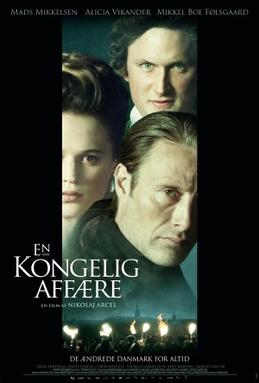
A Royal Affair is a 2012 drama film directed by Nikolaj Arcel, starring Mads Mikkelsen, Alicia Vikander and Mikkel Følsgaard. The story is set in the 18th century, at the court of the mentally ill King Christian VII of Denmark, and focuses on the romance between his wife, Caroline Matilda of Great Britain, and the royal physician Johann Friedrich Struensee.




















